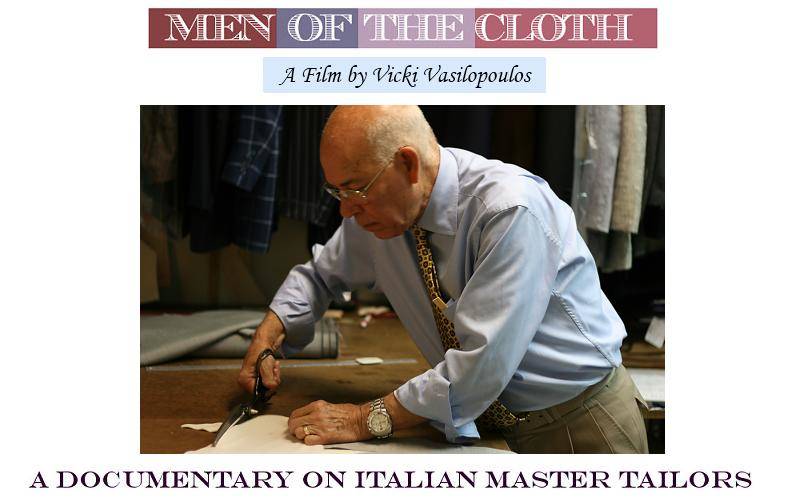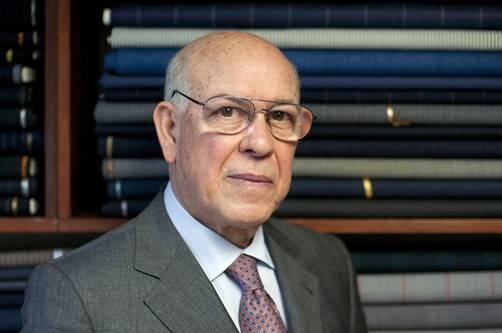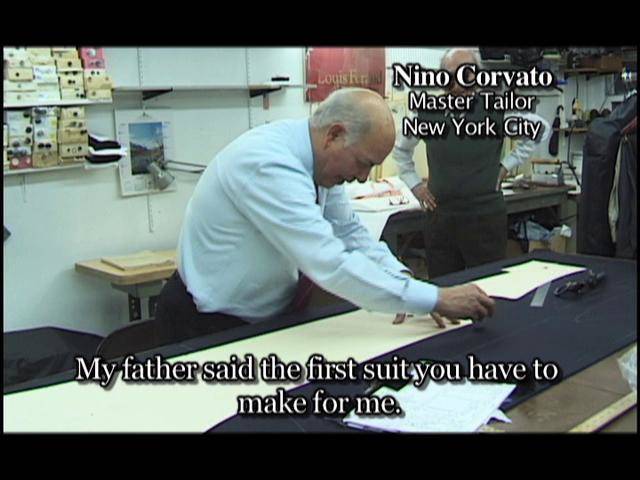Keeping Tradition Alive with the Men of the Cloth
This is the story of three men: “three humble and accomplished master tailors who create masterpieces of elegance and style to clothe the human body,” fashion editor turned documentary director Vicki Vasilopolous writes of her project Men of the Cloth. Their names are Nino Corvato, Checchino Fonticoli and Joe Centofanti and they are survivors in the 21st century, the last representatives of an art from the past.
“Men of the Cloth unravels the complexity of the tailor's artistry and how he crafts a garment
in such a way that it moves and breathes with the person who's wearing it,” the director told i-Italy in an interview. “The film highlights the experiences of these master tailors as immigrant artisans in the U.S. and their challenging roles in the twilight of their career. My goal is to honor the legacy of these master tailors for a younger generation.”
This film is a labor of love that has taken over ten years to make and it contrasts the lives of Nino Corvato in New York and Joe Centofanti in Ardmore, PA, who work as traditional small-scale custom tailors, and Checchino Fonticoli, who spent his entire career at the luxury clothing firm Brioni, based in Abruzzo, Italy.
Nino Corvato is originally from Palermo, and moved to the US searching for a better future when he was 20 years old. “Nino worked for many years as a production manager at Brooks Brothers, and even managed a clothing factory in South Korea. But he never lets go of his dream of having his own label, even turning down a lucrative offer to work for designer Donna Karan after helping her launch her menswear line.” He then opened his own shop in Manhattan and today “artisans from six different countries stitch garments for hours on end. Each suit — which requires three fittings and over 60 hours of labor — is as beautiful inside as it is outside, and is invested with pride, dedication and 250 years of collective work experience.”
Cecchino Fonticoli is originally from Penne, in the province of Pescara. He learned his craft in Rome yet when he was 20 he returned to Penne to join the newly opened Brioni clothing factory founded by his cousin, Nazareno Fonticoli. His creations were worn by famous clients “ Luciano Pavarotti, Nelson Mandela, and Pierce Brosnan, as well as countless kings and heads of state.” Cecchino officially retired several years ago, but he continues to consult for Brioni.
Joe Centofanti is a master tailor whose shop is in Ardmore, PA. Joe was always reluctant to retire (he actually sold his business once, but then realized his mistake, and took it back) because there was no one to take over his craft and clientele. Yet, he took on a young college-educated apprentice, who approached him out of the blue and who learned to make custom suits by hand, thus keeping tradition alive.
I-Italy had a chance to ask to the director Vicki Vasilopolous a few questions and learn more about the project.
How did you decide to shoot a documentary on this topic and how did you chose the tailors portrayed in it?
I never planned on being a documentary filmmaker. But I always loved movies. I met one of my characters, Checchino Fonticoli, when I traveled to Italy on a reporting trip during my tenure as a fashion editor for DNR, the men’s news magazine that’s now part of Women’s Wear Daily. Checchino was the head designer and master tailor at Brioni in Penne, Italy – and that sowed the seeds for the idea of the film. About a year later I started doing research and I paid a visit to master tailor Nino Corvato in New York and Joe Centofanti in Ardmore, PA. Both had a reputation as masters of their trade. But the critical aspect for me was their personal background and life story, along with the unwavering passion for their craft. They were also articulate about describing their craft, so people can relate easily to them when they’re on screen. In addition, I saw that there was both contrast (in their career paths and generational outlook) as well as important similarities that I could underscore in the film.
I was intrigued with the challenge of documenting a disappearing craft that is part of the cultural DNA of Italians.
What compelled you to tell their stories? Do you have any interesting anecdotes you can share?
Men of the Cloth is essentially a human story – it’s about finding your true calling in life -- and that's what makes it universal. As a fashion editor, I saw how our consumer culture promoted so-called “status” clothing. By contrast, my characters embody a tradition that exalts the individual, and values artistry above financial gain.
Making a documentary is full of twists and turns. I thought I was done filming several years ago when I learned that Joe Centofanti had taken on an apprentice. I essentially had to start the film over again: I had to raise more money for production, and making this film turned into a ten-year odyssey. But real life is like that: you have to follow the story where it leads you. And ultimately, I realized that this turn of events would make for a richer, more nuanced film. The lack of apprentices is the central crisis for the perpetuation of this trade, and the reasons for this are complicated, as I explore in the film.
Who is the typical customer of these tailors?
There’s no one type of customer – it could be someone who’s hard to fit anatomically, someone with very discerning taste, someone who loves personalized handmade things – or all of the above. Of course, it’s usually someone with financial means, but it may also be an individual who wants to invest in a suit or jacket that will last him a lifetime and get better with wear.
Do you have an Italian background? What brought you to tell a story with Italian roots?
In my former career as a men’s fashion editor I traveled to Italy on a biannual basis to cover the runway shows in Milan and the Pitti Uomo trade fair in Florence. I fell in love with the culture, which places a premium on an esthetic value system, on artisanship and making things with incredible passion and pride. This soulful approach is compelling, to say the least, and has seduced centuries of travelers to Italy! And, as someone who was born in Greece, and whose father was a craftsman, I discovered a particular affinity that made me feel at home there.
Tell me about the challenges of making this documentary and the decision/need to start a kickstarter campaign.
NIAF provided a few small grants for production in the beginning, but most of the funds have come in the form of small contributions from individuals around the world who love this craft and would like to see these tailors' stories preserved. As a first-time producer/director, it’s been a constant struggle to raise enough funding to properly tell the story and ensure good production values.
On the plus side, I’m thankful for the enormous grass-roots interest in the film that has sustained me and encouraged me to bring this project to fruition.




































i-Italy
Facebook
Google+
This work may not be reproduced, in whole or in part, without prior written permission.
Questo lavoro non può essere riprodotto, in tutto o in parte, senza permesso scritto.